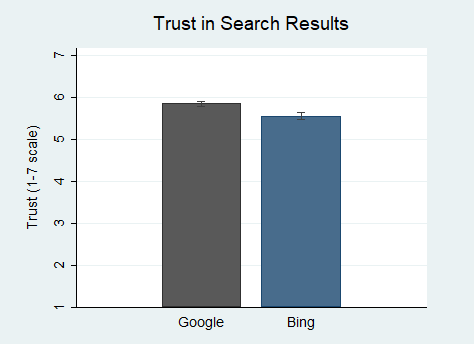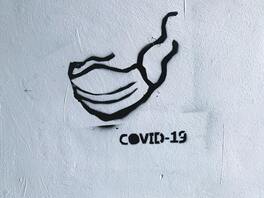Overview
We often take for granted that Google is not the only internet search engine available. Nevertheless, it holds about 90% of the search engine market share; it’s closest competitor, Microsoft’s Bing, holds only about 7% (Statista, 2021).
Although search engines don’t necessarily change the ultimate websites themselves, they can dictate which websites we see. This is becoming a more important question with some search results displaying information from websites without even clicking the link (e.g., answers to questions, or closing hours for stores).
This poses an interesting question. Given Google’s dominance, do people trust internet search results from other search engines less?
The Experiment
We recruited 400 people from Amazon Mechanical Turk to read a hypothetical scenario about searching for a store’s closing hours using either Google or Bing (randomly assigned) before asking them how much they trust the information.
Participants were told the following:
We often take for granted that Google is not the only internet search engine available. Nevertheless, it holds about 90% of the search engine market share; it’s closest competitor, Microsoft’s Bing, holds only about 7% (Statista, 2021).
Although search engines don’t necessarily change the ultimate websites themselves, they can dictate which websites we see. This is becoming a more important question with some search results displaying information from websites without even clicking the link (e.g., answers to questions, or closing hours for stores).
This poses an interesting question. Given Google’s dominance, do people trust internet search results from other search engines less?
The Experiment
We recruited 400 people from Amazon Mechanical Turk to read a hypothetical scenario about searching for a store’s closing hours using either Google or Bing (randomly assigned) before asking them how much they trust the information.
Participants were told the following:
You and a friend are trying to figure out if a certain store in your city is open past 6:00 PM. Your friend pulls out his phone and opens the [Google / Bing] search engine.
[Google’s / Bing’s] search result says the store is open until 7:00 PM.
[Google’s / Bing’s] search result says the store is open until 7:00 PM.
Participants were then “How much do you trust this information? (1 = Not at all, 7 = Very much)” using a 1-7 scale.
Results
An independent samples t-test revealed that people trust Bing’s search results less (avg. = 5.57) than Google’s search results (avg. = 5.85), (p = 0.007). It was a small difference, but nonetheless statistically significant. The results weren’t affected by participants’ gender or age.
Results
An independent samples t-test revealed that people trust Bing’s search results less (avg. = 5.57) than Google’s search results (avg. = 5.85), (p = 0.007). It was a small difference, but nonetheless statistically significant. The results weren’t affected by participants’ gender or age.
Conclusion
The results cannot speak to the actual credibility of search engines. Nevertheless, it seems that people do trust information found through Google a bit more than Bing. So if you’re looking up information for a friend and want to appear as credible as possible, using Google might be your best bet.
It’d be interesting to see if the results differ for other search engines, such as Yahoo, Baidu, or the more privacy-focused Duck-Duck-Go.
Methods Note
We used an independent samples t-test to test for significant differences in perceptions between our two experimental conditions. For significant differences, the difference between the two groups' averages would be large and its corresponding “p-value” would be small. If the p-value is less than 0.05, we consider the difference statistically significant, meaning we'd likely find a similar effect if we ran the study again with this population. To test for significant interactions between the main results and participant demographics, we used OLS regression analyses with interaction terms.
Methods Note
We used an independent samples t-test to test for significant differences in perceptions between our two experimental conditions. For significant differences, the difference between the two groups' averages would be large and its corresponding “p-value” would be small. If the p-value is less than 0.05, we consider the difference statistically significant, meaning we'd likely find a similar effect if we ran the study again with this population. To test for significant interactions between the main results and participant demographics, we used OLS regression analyses with interaction terms.
Popular Experiments
COVID MasksDoes wearing a COVID mask affect how others think of you?
|
Video GamesAre video games more enjoyable than board games?
Does age or gender matter? |
Zero-Sum PoliticsDo Democrats or Republicans view society as win-lose?
|




